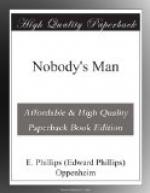“Isn’t he the most impossible person who ever breathed.” she replied. “He was a conscientious objector during the war, a sex fanatic since—Mr. Dartrey had to use all his influence to keep him out of prison for writing those scurrulous articles in the Comet—and I think he is one of the smallest-minded, most untrustworthy persons I ever met. For some reason or other, Stephen Dartrey believes in him. He has a wonderful talent for organization and a good deal of influence with the trades unions.—By the by, it’s all right about the muffins.”
She rang the bell and ordered tea. Tallente glanced for a moment about the room. The four walls were lined with well-filled bookcases, but the mural decorations consisted—except for one wonderful nude figure, copy of a well-known Rodin—of statistical charts and shaded maps. There were only two signs of feminine occupation: an immense bowl of red roses, rising with strange effect from the sea of manuscript, pamphlets, and volumes of reference, and a wide, luxurious couch, drawn up to the window, through which the tops of a little clump of lime trees were just visible. As she turned back to him, he noticed with more complete appreciation the lines of her ample but graceful figure, the more remarkable because she was neither tall nor slim.
“So that was your wife at Claridge’s yesterday afternoon?” she remarked, a little abruptly.
He assented in silence. Her eyes sought his speculatively.
“I know that Lady Clanarton is a terrible gossip,” she went on. “Was she telling me the truth when she said that your married life was not an entire success?”
“She was telling you the truth,” Tallente admitted.
“I like to know everything,” she suggested quietly. “You must remember that we shall probably become intimates.”
“I did my wife the injustice of marrying her for money,” Tallente explained. “She married me because she thought that I could provide her with a social position such as she desired. Our marriage was a double failure. I found no opportunity of making use of her money, and she was discontented with the value she received for it. We have within the last few days agreed to separate. Now you know everything,” he added, with a little smile, “and curiously enough, considering the brevity of our acquaintance, you know it before anybody else in the world except one person.”
She smiled.
“I like to know everything about the people I am interested in,” she admitted. “Besides, your story sounds so quaint. It seems to belong, somehow or other, to the days of Anthony Trollope and Jane Austen. I suppose that is because I always feel that I am living a little way in the future.”
Tea was brought in, and a place cleared for the tray upon a crowded table. Afterwards she lit a cigarette and threw herself upon the lounge.




